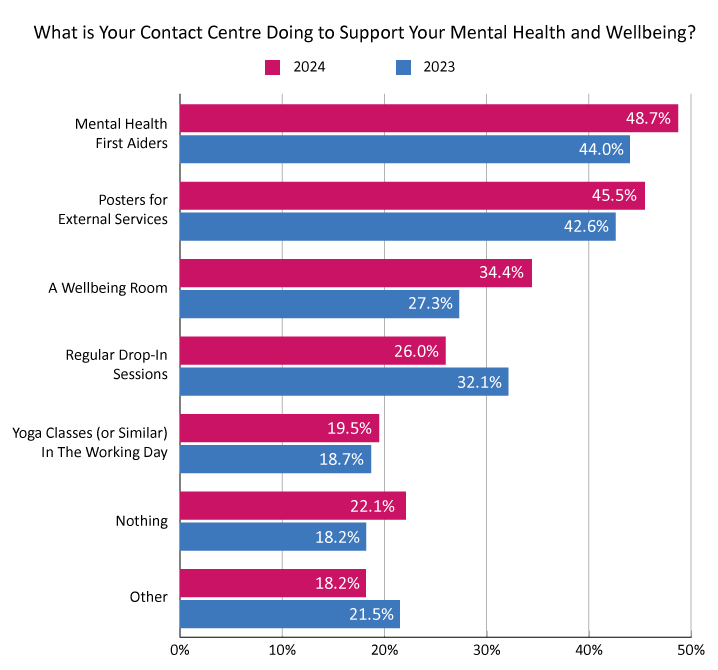Despite the height of the pandemic – thankfully – being a distant memory for most, mental health continues to be a pressing issue in the contact centre.
So how are the best leaders making sure their agents get the support they deserve? To find out, our Editor – Megan Jones – spoke to Clayton Drotsky, David Miller, Doug Casterton, Pete Dunn, Sarah Graham, and Stephen Pace for their best ideas on how to kick-start your mental health strategy.
Proactively Address the Root Causes of Stress
Could your current processes be the cause of stress? You need to find out and fast!
After all, no one will care about free fruit and yoga sessions if the day-to-day hassles of the job are grinding them down and compromising their mental health.
“Your initial focus shouldn’t be on adding new initiatives! If the job is fundamentally stressful, you should be taking steps to improve the situation for everyone – before looking at the fun things you can add on top. As they say, prevention is better than cure!” – Pete Dunn, a contact centre industry expert
This is where a review of your shift patterns can help too, as Doug Casterton, Workforce Optimization Consultant, says,

“When was the last time you considered how shift rotations impact your agents’ sleep patterns? Or how unpredictable schedules create anxiety that follows them home?
The best leaders don’t just manage schedules, they design human experiences that respect mental wellness!
For example, focusing on gradual shift transitions instead of abrupt changes, micro-breaks throughout the day (not just one lunch break), and using analytics to spot burnout indicators before they become problems.”
Did you know? Your leaders’ communication skills could also be undermining your mental health strategy – particularly if they’re not closing the loop on any new information, queries, or concerns (or even nipping gossip in the bud).
It’s important to remember that agents don’t have the same access to information as their managers, so – for example – if an internal email is sent out from the CEO about AI implementation, agents may be quick to jump to conclusions that their job is on the line and take those worries home with them.
It’s key that leaders proactively close the loop and proactively quash any concerns to help their team stay mentally healthy.

“Be more curious! Put yourself in the shoes of others and think “what are my agents facing right now?” and “how are they seeing the world?”.
It’s a leader’s job to shield and reassure their team.” – Clayton Drotsky, Director of Growth Crew Ltd
The link between hearing health and mental wellbeing also shouldn’t be overlooked.
“One in six of the UK population (equivalent to almost 11 million people) lives with hearing loss and when we struggle to hear, we experience stress, frustration, and can begin to feel isolated.
This can all take a toll on our mental health. Beyond challenges with communication, hearing loss can cause withdrawal, embarrassment and overwhelm in noisy social settings.
This isolation creates feelings of loneliness, anxiety, and in some cases, depression. This is twice as common in people with hearing difficulties compared to those without.
For roles like call centre agents, the link between hearing and mental health is even stronger. Daily headset use and the stress of multiple calls can contribute to auditory fatigue, and potential hearing issues.
Prolonged headset use without breaks exacerbates these challenges, whether or not the agents are aware of them. Therefore, being proactive about ear care can help protect the wellbeing and mental health of both individuals and teams, as adjustments can be made efficiently on a more timely basis.” – David Miller, Director of Workplace Ear Care
For practical techniques to help agents better understand and manage their emotional triggers and take control of stress, read our article: Arm Your Agents in the Battle Against Stress
Offer Tailored Support to Help Individuals Thrive
It’s equally vital to treat your agents as individuals! You simply don’t know what people are dealing with in their personal lives and what their triggers are, so take the time to find out!

“Use all of your senses when you’re dealing with your people. You can’t take a department-wide approach and expect everyone to respond in the same way.
Instead, you need to start by understanding an individual’s back story and personal challenges and take the time to support your individual team members in an individual way.
After all, you never know what you might get from investing a bit of extra time with somebody! You might just find they end up being your best agent, supervisor, or even manager in future…
You first just have to step away from your rigid KPI-driven management style to find out!” – Stephen Pace, Strategic Partnership Consultant at Optymyse
The type of questions you ask here can also make the world of difference!
For example, if you’re worried about someone who perhaps isn’t absorbing training material as well as normal or has undergone a dramatic change in their appearance, a simple open question of “Is everything OK? Is there anything you need?” can help.
In the face of challenging behaviour, you could also try taking a deep breath and responding by saying, “You know, I don’t really like the way you just spoke to me, but there’s obviously a reason for it. Do you want to talk about that?”
This approach both lets the agent know their behaviour isn’t acceptable and equally opens the door for a positive, supportive conversation.
Then, sit down and listen!
After they’ve told you what they need, you need to act on it as best as possible. One of the ways you can do this is by supporting your agents with reasonable adjustments in the workplace, as Sarah Graham, Senior People Development and Training Manager at Ocado shares,

“We always stop and ask ourselves “how can we make it as easy as possible for somebody to come into work, when that’s maybe the last thing they want to do?”
For example, we’ve got a range of shift patterns we can offer.
It’s really about adapting to the individuals themselves, recognizing that they are going through a crisis, and openly asking “how can we support you in the best way possible?””.
For three key steps to improving mental health and wellbeing in the contact centre, read our article: A Guide to Improving Mental Health In the Contact Centre
Review the Support Offerings You Have in Place
Our latest Call Centre Helper research on What Contact Centres Are Doing Right Now revealed that mental health initiatives are largely on the increase – with more and more contact centres now supporting their agents with Mental Health First Aiders (MHFAs) and Wellbeing Rooms.

However, it’s paramount to check that the resources you are putting in place are actually being used!
It’s all well and good to say, “We’ve got a helpline” or “We’ve got an app” – but no good at all if no one is making use of the provisions in place.
So do an audit to check what’s been used, how often, and by who – so you can get a true picture of where the budget is being spent and where it’s making the most difference.
And if you find out the resources aren’t being used, ask “why not?”. It may be that it’s not what your team want, or perhaps they don’t even know what’s on offer!
A mini-marketing campaign – even as simple as putting more posters up – can help remind agents about the services and support that are available and boost engagement rates.

As Pete Dunn adds, “When mental health initiatives are being widely used by agents and making a positive difference, they practically pay for themselves, but when they’re not, there can be a disconnect between what the board believes they are offering, and what those on the frontline are actually benefiting from.
You need to find out what’s really happening in your contact centre, because when these supports aren’t being used, it’s not actually helping anyone. Plus, it’s a waste of money that could be better spent elsewhere!”
That being said, you may have the opposite problem and currently have nothing in place at all – just like 21% of contact centre professionals claimed in our latest research.
If that’s the case and you don’t know where to start with offering mental health support, leaning into an awards programme can really help set a framework for you to work to.
“Even if you don’t want to enter in for an award in your first year, leaning into an awards programme framework is such a valuable asset to anyone thinking about improving their mental health provision, as it gives you that initial checklist to work to.
Taking this approach has really helped us to bake mental health and wellbeing into our core culture – without the guess work!” – Sarah Graham
What Are You Doing to Support Agents’ Mental Health in Your Contact Centre?
Join our LinkedIn Community and let us know.
With thanks to the following people for sharing their thoughts and experiences for this article:
- Clayton Drotsky, Director of Growth Crew Ltd
- David Miller, Director of Workplace Ear Care
- Doug Casterton, Workforce Optimization Consultant and Co-Founder of Right Time Right Place
- Pete Dunn, a contact centre industry expert
- Sarah Graham, Senior People Development and Training Manager at Ocado
- Stephen Pace, Strategic Partnership Consultant at Optymyse
If you are looking for more information on improving the mental health of your agents, read these articles next:
- 10 Strategies to Help Agents Feel Less Lonely
- How to Better Support Men’s Mental Health in the Contact Centre
- Introduction to… Vicarious Trauma in the Contact Centre
Author: Megan Jones
Reviewed by: Jo Robinson
Published On: 25th Jun 2025 - Last modified: 15th Sep 2025
Read more about - Call Centre Management, Clayton Drotsky, David Miller, Doug Casterton, Health Wellbeing and Stress, Management Strategies, Pete Dunn, Sarah Graham, Stephen Pace, Team Management, Top Story















